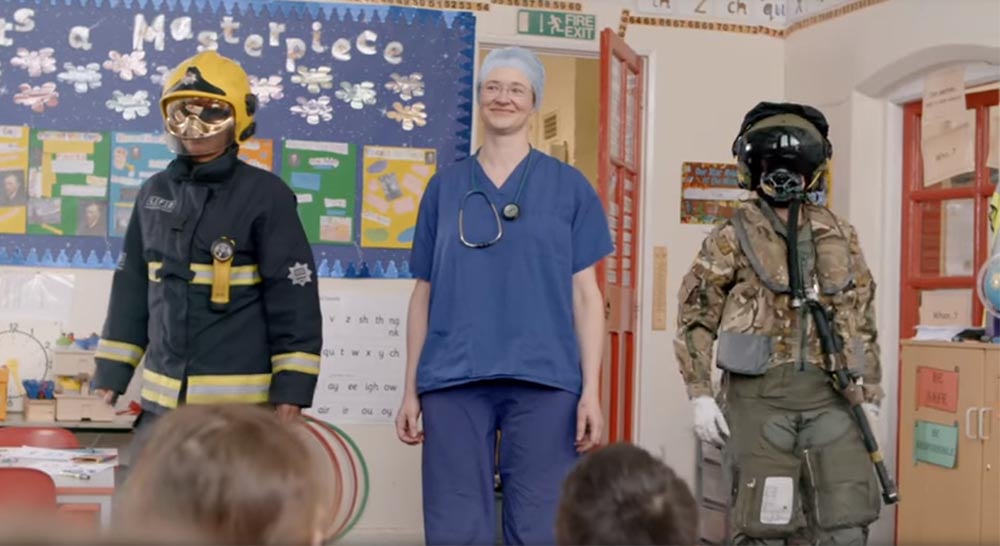Skills mismatch observed in the labour market has its roots in primary school

Mismatch between career aspirations and labour market demand could undermine fourth industrial revolution #4IR
The mismatch between children’s career aspirations and labour market demand could undermine the fourth industrial revolution, says a new report by the OECD and Education and Employers.
For the first time World Economic Forum delegates will visit Davos primary school to emphasise the importance of engaging with young children to help ignite their ambitions.
The OECD and the UK-based charity Education and Employers are launching a new report, “Envisioning the Future of Education and Jobs: Trends, Data and Drawings“, at the World Economic Forum today (23 Jan) at 12.00 in the Deloitte Green Room, in the Steigenberger Grandhotel Belvedere, Davos.
The report looks at how to prepare the leaders of the future for the challenges and opportunities presented by the fourth industrial revolution, looking at the future of education and jobs and what this will mean for our children, and how we educate them.
The OECD will be calling on governments, employers and educators to work far more closely together to help broaden young people’s horizons, raise their aspirations, and provide them with the vital work-related knowledge and skills that will help them as they make the transition from school to work.
Mismatch

Not only will this help give our young people the best possible start in life, it will reduce mismatch between young people’s aspirations and the demands of the labour market, thereby ensuring that we have a workforce that will secure our economic prosperity in the future.
It concludes that the skills mismatch observed in the labour market has its roots in primary school, and that giving all children, regardless of gender and social background, the same chance to meet professionals in a variety of fields is key to widening their view of the world of work.
Both the event and report highlight the mismatch between children’s career aspirations and the demands of the future labour market – which will prevent us from overcoming the skills-gap and meeting the challenges of this digital and high-technology revolution.
The day before, on Tuesday 22 January at 13.45, a delegation from the World Economic Forum visited the local primary school in Davos for the first time, giving the school children the chance to ask questions about their jobs and career routes. The children had been asked in advance about their career aspirations, who inspires them, what issues about the future of the world matter to them and what they know about the World Economic Forum that takes place every year right next door to their school. The vast majority want to be sports stars or teachers, or enter a technical/manual profession.
The report identifies a number of global trends, drawn from the recently published OECD report, “Trends Shaping Education 2019“, that are having an impact on education systems, and how we can best prepare children for their future. Globalisation affects teaching as classes become more diverse and accommodate students from different backgrounds.
Social change is creating an urgency to teach children about the impact of their daily decisions and life styles, and how to adapt to an environmentally sensitive economy.
Digitalisation, rapid technological change and the gig economy are creating different jobs and the need for different skills. Work is no longer tied to a steady job, and a familiarity with technology, mathematics and science is increasingly important.
At the same time, longer working lives increase the need for continuous learning.
How do we ensure that children are ready to meet these challenges and create a prosperous economic future for all?
“The future will be about pairing the artificial intelligence of computers with the cognitive, social and emotional capabilities of humans, so that we educate first-class humans, not second-class robots,”
– Andreas Schleicher, Director of Education and Skills at the OECD.
Drawing the Future
Building on the Drawing the Future report launched at last year’s World Economic Forum, which showed that gender stereotyping about jobs starts at a young age and is a global phenomenon, Education and Employers have analysed the career aspirations of young people in the UK aged 7-11 and 17-18 and mapped these against projected labour market demand.
It is clear that the types of jobs 7-11 year-olds envision for themselves are similar to those cited by 17-18 year-olds – with the top choices being culture, media and sport occupations.
This aligns with findings from the OECD Programme for International Student Assessment (PISA) which reveal that one in three 15-year-olds wants to work in just 10 different occupations – including doctor, teacher, lawyer, vet and sports player. Previous research has shown a wide gap between adolescents’ career aspirations and projected labour market demand.
“We now know that this mismatch is set at a young age and heavily influenced by socio-economic background, gender and the role models seen by children,” says Nick Chambers, CEO of Education and Employers.
“This means we need to engage with children early on to help inspire their interests and career aspirations. They are our future workforce and key to the success of the fourth industrial revolution.”
“As global leaders meet this year in Davos to discuss Globalization 4.0: Shaping a Global Architecture in the Age of the Fourth Industrial Revolution, we would do well to remember the talent pipeline that will enable us not only to take on the challenges but capitalise on the advantages of the fourth industrial revolution. This means understanding the trends in this report and imparting that understanding to our children as early as possible,” concluded David Cruickshank, Global Chairman of Deloitte and Chair of the Board of Trustees of the Education and Employers charity.
The OECD’s Director for Education and Skills Andreas Schleicher will be joined by 2018 Global Teacher Prize winner Andria Zafirako, Deloitte Global Chairman David Cruickshank and Education and Employers CEO Nick Chambers to discuss the report. Tune in to the live broadcast on Facebook on Wednesday, 23 January, and Twitter to join the conversation.











Responses